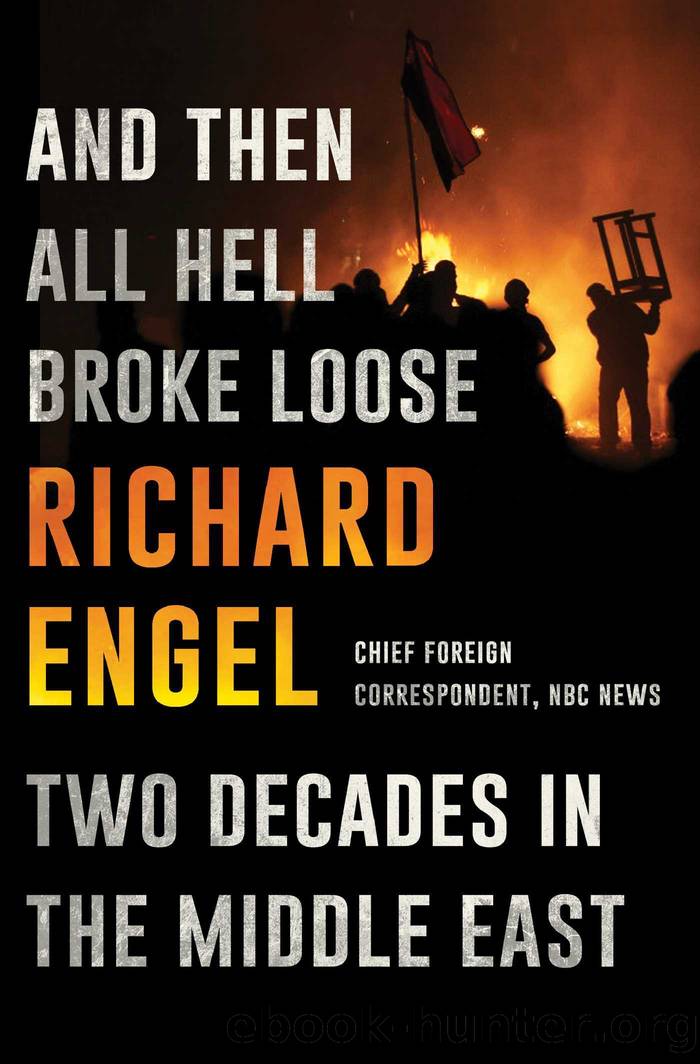And Then All Hell Broke Loose by Engel Richard

Author:Engel, Richard [Engel, Richard]
Language: eng
Format: epub
Tags: Humor & Entertainment, International & World Politics, Middle Eastern, Politics & Social Sciences, Middle East, Historical, Biographies & Memoirs, History & Theory, Politics, War, Journalists, Memoirs, Biography, History, Professionals & Academics, Relations, Political Science, Politics & Government
ISBN: 9781451635133
Amazon: 1451635133
Barnesnoble: 1451635133
Goodreads: 26586357
Publisher: Simon Schuster
Published: 2016-02-01T08:00:00+00:00
SIX
I TURNED THIRTY-THREE SHORTLY AFTER I began settling down in Beirut after the month-long Lebanon war. I was fulfilling my ambition, covering the biggest story of my generation, and I was being rewarded with praise and promotions from my bosses at NBC. But I sure wasnât living a normal life.
For years I had frenetically covered the fighting in Iraq, spending six or eight weeks in the war zone, then pulling out for a couple of weeks of R & R at a hotel in Thailand or Italy, then returning to the nerve-jangling violence of Baghdad. Then when I finally got the go-ahead to set up a bureau in Beirutâwhich I thought would bring a modicum of stability to my lifeâthe Israelis and Hezbollah started killing each other.
The shooting finally stopped on August 14, 2006, and I found the apartment of my dreams in Beirut on a small, historic street near the Albergo Hotel. Ironically the apartment had been vacated by an Italian diplomat during the fighting. Israel was bombing Hezbollah strongholds in south Beirut both from the air and from the sea and at times the fighting was getting close to the center of the city.
So now I had a place to call home. I started dating again and had a lively social life, unremarkable for a single guy my age unless youâre a single guy who had spent the past few years putting your mattress against hotel windows as a defense against car bombs.
I had a broader journalistic portfolio now, but Iraq was still at the center of the action. The triumphant US invasion had become a sectarian struggle that was far more savage and sinister and seemed to go on forever. To understand why, you have to go back to the debate over the American invasion. President Bush seemed obsessed with Iraq. He believed that if the United States got rid of Saddam Hussein and instituted democratic reforms, the Middle Eastâand the worldâwould be a safer and better place. He seemed to have no idea, however, how it would happen. The administration often used the analogy of planting the âseeds of democracyâ in the Middle East, as if theyâd sprout into democratic regimes as nature took its course. Democracy doesnât sprout like apple trees. Scattering the seeds isnât enough, no matter how many soldiers do it. To continue with the gardening analogy the Bush administration seemed to love (there were also many âseeds of terrorâ and âseeds of hopeâ), democracy is more like a fragile flower that requires constant attention and the right soil. Dictatorships and fascist regimes are hardy weeds that sprout on their own.
The casus belli, of course, was Iraqâs purported arsenal of weapons of mass destruction (WMD). A secondary rationale was an alleged link between Saddam and al-Qaeda. âWeâve learned that Iraq has trained al-Qaeda members in bomb-making and poisons and deadly gases,â Bush said on October 7, 2002, five months before the invasion.
I thought this was preposterous, as did most people familiar with the Middle East, but the supposed presence of WMDs made it a secondary concern.
Download
This site does not store any files on its server. We only index and link to content provided by other sites. Please contact the content providers to delete copyright contents if any and email us, we'll remove relevant links or contents immediately.
| Bahrain | Egypt |
| Iran | Iraq |
| Israel & Palestine | Jordan |
| Kuwait | Lebanon |
| Oman | Qatar |
| Saudi Arabia | Syria |
| Turkey | United Arab Emirates |
| Yemen |
Empire of the Sikhs by Patwant Singh(23070)
The Wind in My Hair by Masih Alinejad(5091)
Rise and Kill First by Ronen Bergman(4778)
The Templars by Dan Jones(4681)
The Rape of Nanking by Iris Chang(4202)
12 Strong by Doug Stanton(3541)
Blood and Sand by Alex Von Tunzelmann(3194)
Babylon's Ark by Lawrence Anthony(2671)
The History of Jihad: From Muhammad to ISIS by Spencer Robert(2618)
No Room for Small Dreams by Shimon Peres(2362)
The Turkish Psychedelic Explosion by Daniel Spicer(2353)
Inside the Middle East by Avi Melamed(2349)
Gideon's Spies: The Secret History of the Mossad by Gordon Thomas(2337)
Arabs by Eugene Rogan(2292)
The First Muslim The Story of Muhammad by Lesley Hazleton(2263)
Come, Tell Me How You Live by Mallowan Agatha Christie(2249)
Bus on Jaffa Road by Mike Kelly(2150)
Kabul 1841-42: Battle Story by Edmund Yorke(2022)
1453 by Roger Crowley(2022)
